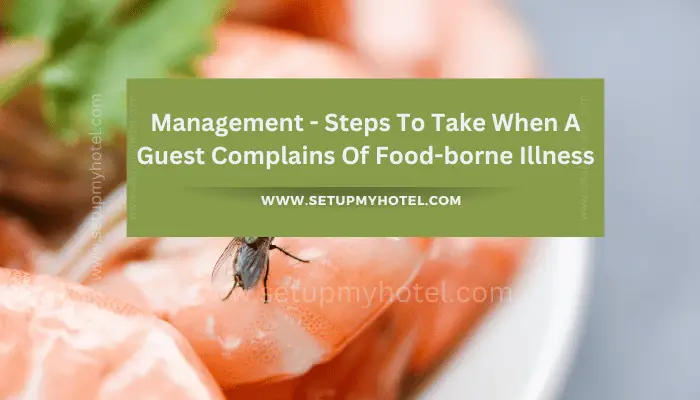Hotel Management’s Steps to Take When Handling Guest Complains of Food Poisoning
The HotelA Hotel or Inn may be defined as an establishment whose primary business is providing lodging facili... Management should have a plan for handling such situations; all HOD’s should practice it, and communicate it to their team members employees. The General ManagerManager is a person in the hotel operations who is assigned to manage or supervise a group of employ... should determine who is authorized to speak to any guests complaining of illness and what the proper response should be. The plan should also clearly outline the steps to take from how to respond to the customer, notify vendors, to when and how to contact the authorities.
It is essential that management and staff do certain checks every time a hotel kitchen opens and closes. These should include: making sure fridges, chilled display equipment and freezers are working properly; ensuring staff are fit for work and wearing clean work clothes; and confirming that food preparation areas are clean and disinfected and there are plenty of hand washing and cleaning materials available.
The first step is to take the complaint seriously and listen carefully to the guest’s concerns. Ask them to provide as much information as possible about what they ate, when they ate it, and any symptoms they may be experiencing. This information can help you identify the potential source of the illness and take appropriate action to prevent it from happening again.
Next, it is important to investigate the issue thoroughly. This may involve reviewing your food handling and storage procedures, checking for any potential sources of contamination, and talking to staff members who may have been involved in preparing or serving the food in question.
If you determine that the illness was indeed caused by food poisoning or other food-borne illness, the next step is to take corrective action. This may involve throwing out contaminated food, sanitizing surfaces and equipment, and reviewing and revising your food safety policies and procedures.
Finally, it is important to communicate with the affected guest and any other customers or staff members who may have been exposed to the illness. This may involve offering a refund or compensation, providing information about the steps you have taken to address the issue, and reassuring guests that you are committed to providing safe and healthy food.
By taking these steps and being proactive about food safety, you can help prevent food-borne illnesses and protect the health and well-being of your guests and staff members.
Steps to Take When a GuestDefinition of Guest in Hospitality Industry: A guest is the most important person in any business. A... Complains of Food borne Illness
- Show care and concern. You are in the hospitality business and you want to exceed your guests’ expectations so being empathetic should be second nature.
- Ensure you get the callers contact information.
- Document the name, address, and telephone number of the guest who complains of an illness.
- Note down the date and time the guest visited your restaurant.
- Document all items eaten in your facility by the guest during the visit in question.
- Obtain the name and address of the physician treating the guest. If the guest has not contacted a physician, encourage him or her to do so.
- Contact the physician to determine if in fact a case of foodborne illness or food poisoning has been diagnosed.
- Notify the local health department immediately if a foodborne illness outbreak is confirmed, so the staff there can assist you in determining the source of the outbreak, as well as identifying affected guests and employees.
- Evaluate and, if necessary, modify your training and certification efforts that relate to the areas involved in the incident.
- Document your efforts, and notify your attorney or company risk manager.
- Notify the chef immediately; Chef should ensure his employees are following all food handling rules.
- Secure all the ingredients in the dish with potential contamination.
- If there are more complaints, local health authorities, the CDC, and vendors must be contacted.
- All affected diners must be contacted to offer them assistance and reimbursement.
- Hotel or Management obligation now is to clean, contain, and cooperate with local and federal health agencies.






